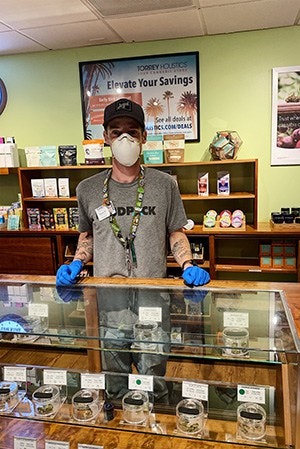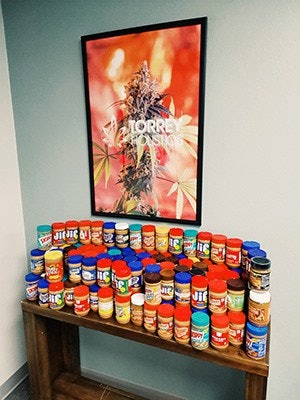
When the team at Torrey Holistics realized that health care workers on the frontlines of the COVID-19 pandemic were in dire need of face masks and other necessary medical supplies, co-owner Tony Hall leveraged his background in chemical and safety supplies to help fill the gap.
Since mid-March, Hall and Torrey Holistics co-owner Doug Gans have donated more than 7,000 N95 face masks and more than 10,000 units of hand sanitizer to various health centers and local organizations, as well as to the San Diego-based dispensary’s staff and customers.

“[We] were just hearing all these stories from doctors and nurses who were having to reuse their masks, and how dangerous that was,” Ruthie Edelson, Torrey Holistics’ marketing director, told Cannabis Business Times.
The Torrey Holistics team visited six different hospitals and health clinics, including the American Red Cross, VA San Diego, Family Health Centers of San Diego, Scripps Hospital, UCSD Jacobs Medical Center, St. Paul’s Senior Services and Remedy RX, to deliver the supplies personally.
In addition, Torrey Holistics is distributing free hand sanitizer to its curbside pickup and delivery customers.
The dispensary will donate a portion of its April sales to St. Paul’s Senior Services and the Senior Adult Department at the Lawrence Family JCC to help support efforts to protect the vulnerable senior population during the pandemic.
Torrey Holistics opened in 2015 as a medical cannabis dispensary and was one of the first California retailers to receive an adult-use license in December 2017, Edelson said.
“We are definitely small and mighty,” she said, adding that the Torrey Holistics team has always centered its business around education and community.
The dispensary has participated in several community outreach programs during its years of operation, including donations to area food banks and beach clean-up days.
During these uncertain times, Torrey Holistics is continuing to support those in need while protecting its own staff and customers as local and state policies continue to evolve in response to the COVID-19 outbreak.
“The city continually updates us on what we need to do ensure that the staff is safe [and] ensure that our customers are safe,” said Kalina Fernandez, Torrey Holistics’ purchasing manager.
The dispensary has shifted its operations to curbside pickup and delivery services, and the management

The dispensary has collected peanut butter to support local food banks.
team is constantly updating the store’s SOPs to align with new guidance from local and state officials.
“We are keeping clearly marked social distancing guidelines in the store, in the lobby and outside of our store,” Fernandez said. “All of our drivers and all of our staff are wearing masks and gloves. We’re giving out hand sanitizer as well as using hand sanitizer. We’ve installed several hand sanitizer units [in what] seems like every square inch of our shop, but it is what it is and it’s what needs to happen right now.”
Roughly 75% of the dispensary’s sales are now conducted through its delivery service, she added, and the store has seen a decrease in vape sales.
“I think we’re back on that bandwagon of bringing attention to the fact that what’s going on right now is an upper respiratory issue, and vaping and upper respiratory just don’t mix,” Fernandez said. “Vape sales have gone down, but oddly enough, flower sales have gone up.”
Torrey Holistics’ customers are purchasing product in larger quantities since the start of the COVID-19 outbreak, she added, and the company’s supply chain has remained largely uninterrupted to allow the dispensary to meet this increased demand.
Looking ahead to 4/20, the company will try to maintain business as usual, but it has canceled on-site vendors who had planned to visit the store to interact with customers. Torrey Holistics is also encouraging customers to use its curbside pickup and delivery services to minimize the number of people in the store.
“We’re going to make it work and we’re going to do what we can to give our customers not only the best service, but also great deals,” Fernandez said. “We don’t want to encourage people to wait in line for long periods of time, so we’re focusing our specials and deals to bring people into curbside and/or the delivery service as opposed to coming in. It’s just a sharp pivot."























